

Slavoj Zizek on cloud computing as corporate enclosure of the ‘general intellect’ Excerpted from Slavoj Zizek: “Users today access programs and software maintained far away in climate-controlled rooms housing thousands of computers.
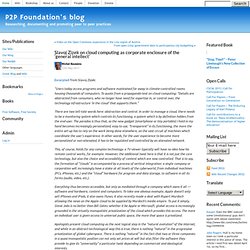
To quote from a propaganda-text on cloud computing: “Details are abstracted from consumers, who no longer have need for expertise in, or control over, the technology infrastructure ‘in the cloud’ that supports them.” Understanding the Fourier transform » #AltDevBlogADay. Eventually Consistent - Revisited. I wrote a first version of this posting on consistency models about a year ago, but I was never happy with it as it was written in haste and the topic is important enough to receive a more thorough treatment.
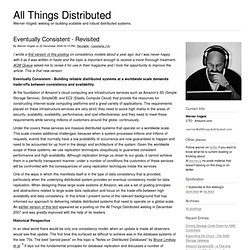
ACM Queue asked me to revise it for use in their magazine and I took the opportunity to improve the article. This is that new version. Eventually Consistent - Building reliable distributed systems at a worldwide scale demands trade-offs between consistency and availability. At the foundation of Amazon's cloud computing are infrastructure services such as Amazon's S3 (Simple Storage Service), SimpleDB, and EC2 (Elastic Compute Cloud) that provide the resources for constructing Internet-scale computing platforms and a great variety of applications.
Under the covers these services are massive distributed systems that operate on a worldwide scale. Historical Perspective In the mid-'90s, with the rise of larger Internet systems, these practices were revisited. Age of the Algorithm. Content farms depend heavily on search engines for traffic.
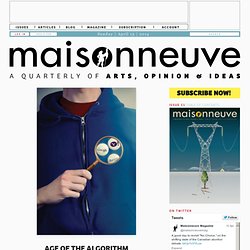
Techno-optimism. ‘‘Are you optimistic or pessimistic about the future?’’
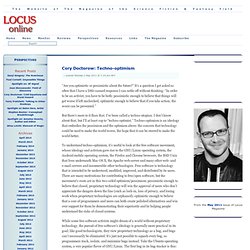
Defending Freedom in the Digital World. Mob-sourcing: the prejudice of crowds. As more web content is crowd sourced and crowd moderated, are we seeing only the wisdom of crowds?
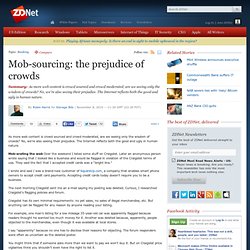
No, we're also seeing their prejudice. The Internet reflects both the good and ugly in human nature. Tummeling & the Twitter Chat: A Network Map of #IDEACHAT by ORGNET.COM. Network Weaving. Sunday Post on Crypto, Trust, and Political Action on the Web — Outsourced to David P. Reed « The Inverse Square Blog. I’m a lurker (mostly) on a listserv for MIT’s Center for Future Civic Media (C4), which pops up some fascinating discussions about news, social networking, and political life on and through the web.

That announcement was followed by the effective end of the project, which had aimed at providing political dissidents secure ways to communicate. That sequence of events led to considerable back and forth among the C4 community, in part looking at the perennial problem of hype in the tech/software world outpacing reality. The more significant strand to the convesation (it seemed to me) focused on something else: the underlying issue of whether or not it is possible to produce a genuinely secure set-up that could enable the kind of sunlight the Iranian dissidents sought (and needed) and their supporters outside Iran hoped to provide. Internet Explorer cannot display the webpage. Viral Ideas are grassroots innovations that start at the edges of networks and industries, take only small investments to begin, yet build through social and technical opportunism to swamp entrenched, vertically integrated companies.
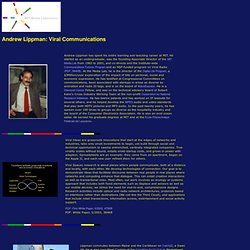
True virality scales without bound, entails small startup costs, and grows in power with adoption. Spreadsheets are an example: they came from an apartment, began on the Apple II, and each new user refined them for others. Viral Spaces research is about places where people communicate, both at a distance and locally, with each other. We develop technologies of connection. The Croquet Project. ...a new open source software platform for creating deeply collaborative multi-user online applications. It features a network architecture that supports communication, collaboration, resource sharing, and synchronous computation among multiple users.
Using Croquet, software developers can create powerful and highly collaborative multi-user 2D and 3D applications and simulations. For Mac, Linux, and Windows Platforms! In order to reduce the load on our servers, the Croquet SDK is being made available via BitTorrent. Dpr. What do we teach when we teach science in school?
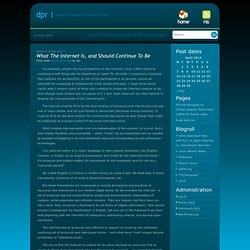
And really, why do we teach science that way? I’ve personally never been quite sure whether I’m more of a scientist, engineer, or mathematician. The public lumps these all together for some reason, perhaps because they all appear to deal with concepts that are expressed in terms that must be learned carefully, because they certainly are not wired into our brains, and they aren’t the basis of popular culture either, unlike literature, art, history, sports, etc.
The science we teach is pretty old. David P. Reed Biography. Dr.

David P. Reed enjoys architecting the information space in which people, groups and organizations interact. He is well known as a pioneer in the design and construction of the Internet protocols, distributed data storage, and PC software systems and applications. He is co-inventor of the end-to-end argument, often called the fundamental architectural principle of the Internet. Recently, he discovered Reed's Law, a scaling law for group-forming network architectures. His current areas of personal research are focused on densely scalable, mobile, and robust RF network architectures and highly decentralized systems architectures. Research Career. MondoNet, a global wireless mesh network. MondoNet, a global wireless mesh network Sepp Hasslberger 7th May 2011 According to an article in ITWire.
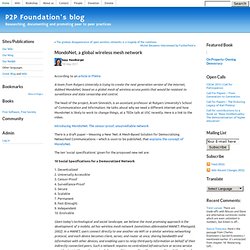
Arts and Culture - Jonathan Shapiro on ‘The Tyranny of Dead Ideas’ Jonathan Shapiro on ‘The Tyranny of Dead Ideas’ Posted on Mar 27, 2009. Single Point of Failure. A single point of failure (SPOF) is a part of a system that, if it fails, will stop the entire system from working.[1] They are undesirable in any system with a goal of high availability or reliability, be it a business practice, software application, or other industrial system.
Overview[edit] Systems can be made robust by adding redundancy in all potential SPOFs. Aramis, or the Love of Technology: Bruno Latour. Computer Chips Seem Poised to Shrink Again. A Moore’s Law for Technology Services? - Bits Blog - NYTimes.com#more-4687#more-4687. The problem with the iPad and Facebook. xWeb. BEinGRID - Business Experiments in Grid: BEinGRID. Visualizing the Wikileaks Data.
Vision Statement: Mapping the Social Internet. Analysis by Mikolaj Jan Piskorski; visualization by Tommy McCall Click here for a larger image of the graphic. Blogs. Status updates. Family photo albums, political tweets, viral videos. WHAT WE CANNOT PREDICT - An EDGE Special Event. Internet electricity use is huge, but industry isn't worried - May. 3. Tomboy : Simple note taking. What is Bitcoin? - We Use Coins. Games. Track Google Sidewiki Comments Via RSS. Gears. Google Buzz and hybrid blogging - O'Reilly Radar. Blogging Software, Business Blogs & Blog Services at TypePad.com. Fring. Product Managers & Marketers: What The Internet of Things Means For You. Optimized » Blog Archive » Umeshisms. Social Steganography: Learning to Hide in Plain Sight.
Social Steganography: Learning to Hide in Plain Sight. The 'Web Squared' Era - Forbes.com. UK Startup Failbetter Games: Steampunk, Storytelling, Flowcharts, and Twitter as a Gaming Platform. US CIO Kundra Calls for Web 2.0 Co-Creation of Knowledge With Citizens. A Little Perspective (Digg, Twitter, Facebook) Version 4. Virulent Word of Mouse. Grassroots Mapping: tools for participatory and activist cartography. A-Z of the new technology, new products, new trends changing agriculture. Cutting back on your long list of passwords. The Art of Analog Computing. Swype Reinvents Typing on Touch-Screen Phones.
Mapping, Circumventing, Translating, Sharing. Cell Phones, Microwaves And The Human Health Threat. Byliner. The New York Times’ R&D Lab has built a tool that explores the life stories take in the social space. SocialCalc Comes Out of Beta, Marking 30th Anniversary of VisiCalc, the first Spreadsheet Technology - ReadWriteEnterprise. The Litl Webbook: A more social computing device. Alan Sugar: iPod Will Die - Worst Predictions. Time Explorer. Today’s CAD Packs a Lot: TimeCompression.com. Book - VisMaster. Combinatorial Auctions. Genetic Programming and Data Structures. Conference on Systems Engineering Research. Piazzza Gives Classmates An Online Forum To Trade Their Knowledge. View the iPad as a magazine opportunity, not a container. Snap to the graph, not the grid.
Self-Reconfigurable Robots. Technology Review: Blogs: Jason Pontin's blog: Davos Day 3: Technology Is Like Magic. What Defines a Meme? Required reading – An anthropological introduction to YouTube. Analytics X - Home. Infotention Part One: Dashboards, Radars, Filters. Linked data creates a new lens for examining the U.S. Civil War. Fix reviews' grammar, improve sales - A Computer Scientist in a Business School. A Computer Scientist in a Business School. Infotention Part Two: Building Information Dashboards. Non-Randomness in Coin Flipping. Official SCAR Manual. Esther Dyson - Net World. Weekend Project: Experiment with Chrome OS by Installing "Vanilla" to a USB Drive.
FP-RosenfeldEvan - CS448B Data Visualization. Theory and practice of provenance. The power of random- Seemingly loopy technique could dramatically improve communications networks. Crowdsourcing Crisis Information (FOSS) The Ushahidi Blog. Twitter as Good as a Telephone Survey? Plugging water leaks with data. 66% of American adults have a home broadband connection in 2010, little changed from the 63% who did so in 2009. Gallager codes. The Problems With ‘Platforms’ The Politics of 'Platforms' Problems with Unscientific Security. "intelligent" Stamps and the Maturation of Augmented Reality. Lost in the Cloud. Why speed matters.
Data. Networks.